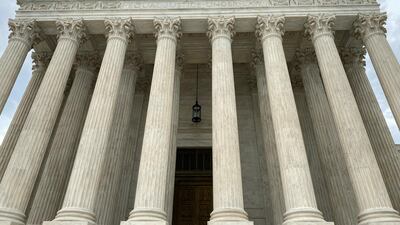The US attorney for the Southern District of New York on Tuesday announced that businessman Michael Rose had been charged with selling goods worth more than $350,000 to Iran in breach of sanctions.
Audrey Strauss, the US attorney for the district, said that Mr Rose was accused of selling the goods to an Iranian importer, in addition to alleged money laundering and bank fraud.
The FBI and the Office of Export Enforcement carried out the arrest.
On Tuesday afternoon, Mr Rose was to appear in the Manhattan Federal Court before US Magistrate Judge Stewart Aaron.
The indictment said that among other things, Mr Rose exported cosmetics to Iran through front companies between 2015 and 2018.
He “participated in a conspiracy to evade US sanctions on Iran by causing Company 1 to export from the United States more than $350,000 worth of cosmetics to an importer in Iran", the indictment said.
In addition to shipping goods and accepting payments in breach of US sanctions, Mr Rose “also filed false and misleading information on United States Department of Commerce shippers' export declaration forms in connection with the illegal shipments".
He falsely claimed that the “ultimate consignee” for the goods “was in the United Arab Emirates, not Iran".
Ms Strauss said the charges highlight that the Justice Department would go after those who breached sanctions.
The charges Mr Rose is facing include conspiring to breach the International Emergency Economic Powers Act, which carries a maximum sentence of 20 years in prison.
He is also charged with conspiring to launder money, which carries a maximum 20 years in prison, and conspiring to commit bank fraud, with a maximum of 30 years in prison.
Danya Perry, one of Mr Rose's lawyers, declined to comment on the indictment.
Meanwhile, US negotiators travelled to Austria to attend talks on Iran's nuclear programme, which an Iranian delegation will also attend.
Tehran publicly requested the removal of sanctions before the meeting.
Experts say that the US Justice Department is unlikely to be affected by the diplomatic clock.
“The US criminal justice system proceeds on its own schedule,” said Henry Rome, a senior Iran analyst at the Eurasia Group.
"I wouldn’t necessarily conclude the arrest in New York is timed to coincide with the start of indirect US-Iran talks today.
“The message from the Justice Department continues to be pretty clear that violations of US sanctions law will be prosecuted regardless of the diplomatic climate."
Ryan Bohl, of intelligence analysis group Stratfor, said the arrest implied a continuation of sanctions enforcement by the Biden administration.
“We may still be too early in the Biden administration to be looking for symbolic concessions," Mr Bohl said.
“The biggest risk on easing up sanctions enforcement will be that you could cause a flood of sanctions violations, which would undermine the US negotiating position."
He described it as "politically fractious" for the White House to ease prosecutions of sanctions now, but if talks proceed andsignificant progress is made, the priority could be reduced by the Justice Department.


